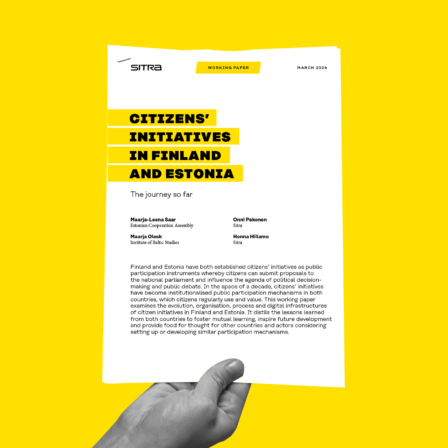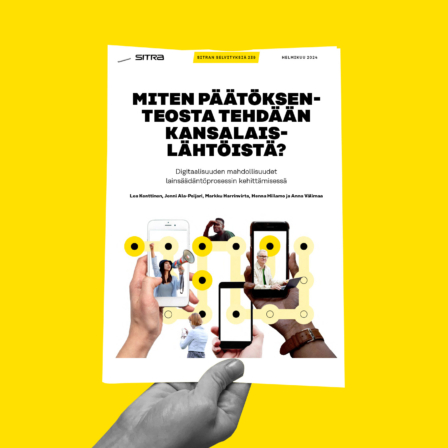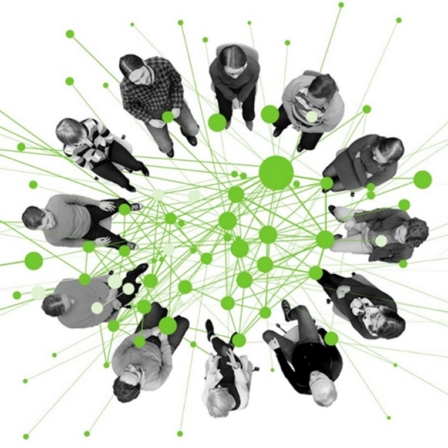Decision-makers in Europe are susceptible to unnoticed forms of influencing in digital environments, says Sitra’s Digipower investigation. This vulnerability is due to the collection of data being more large-scale than previously known, covering all aspects of everyday life.
The investigation paints a picture of the operating logic of the data economy, which offers opportunities to influence and to “resell” such influence potential. The bigger the player concerned and the more data it has, the more scope for influence and power it has.
“We – politicians included – have no tools to protect our data. As a result, we face a seemingly hopeless challenge when using digital services. At the same time, politicians are increasingly susceptible to online influencing,” says Tiina Härkönen, Leading Specialist in Sitra’s Fair data economy theme.
The forms of data-driven digital power identified in the investigation included the ability to influence individuals, groups of people, technological development and the ability to predict the future. According to the investigation, digital power is deeply embedded in the fabric of society and is concentrated in the hands of a few data giants.
The investigation involved 15 societal influencers from Europe (list below). The aim was to show what happens to their data and how data becomes power. The investigation, which shed light on data collection and use in online environments, found that data collected from a single website visit not only spreads to a much larger range of actors than expected, but also enables decision-makers to be profiled in greater detail than previously thought.
For example, a single click on a newsletter by one of the test subjects, a politician, unexpectedly revealed their location to a chain of home electronics stores, even though the test subject was unaware of having given permission to use their location data.
“For me there was no surprise – it is as bad as we think it is,” says Stéphane Duguin, CEO of the CyberPeace Institute, who was one of the test persons.
MP startled by the results: “Plenty of room for improvement in the transparency of the use of power”
The results of the investigation startled the test subjects into seeing the data economy in a new light – which was one of its aims. The results raised questions about issues such as privacy, the wide scope for influencing through information and security both online and offline.
“Everyone should be able to monitor and control their own data and how it is collected and used. It is important that legislation keeps pace with technological developments and that democracy is in the driver’s seat in a changing world. At the same time, I was left thinking that data in itself does not tell us everything about how it is used and combined. There is still work to be done on transparency in the data economy and the use of power,” says Atte Harjanne, Member of the Finnish Parliament and Chairperson of the Green Parliamentary Group, who was one of the test subjects.
”The newspaper I trusted – I go to website and think they are giving me information – no! They are gathering information of me,” says MEP Leïla Chaibi, who was also a test person.
“What was perhaps surprising about the investigation was the scale of trading. The lack of transparency was surprising, although many might think that it doesn’t matter if the data is only for advertising purposes. But there is a fundamental issue of privacy in targeted advertising, and it is not just marketing,” says MEP Miapetra Kumpula-Natri, who was also a test subject.
Paul-Olivier Dehaye of Hestia.ai, the company responsible for the investigation’s data analysis and the data training of the test subjects, says that a kind of scientific revolution is needed in data, where truth is no longer taken as given from above.
“In the scientific revolution, things started to be systematically studied, It changed the way we all see reality. We may need a similar transformation now. We don’t need to trust CEOs and hand over data and power to them. People can claim the data and for themselves and use it as they wish,” says Dehaye.
Did someone peek over your shoulder in the shop? – Shopping leaks your data to the world
Transparency in the use of data is important for our privacy and for identifying new forms of influencing and digital power. The Digipower investigation indicates that Google and Facebook, for example, may currently receive data about not only our online shopping but also purchases made in actual bricks-and-mortar shops.
The investigation also confirmed that data platforms act as resellers of power. For instance, on Twitter, the analysis showed that the topics of discussion associated with the themes of paid advertisements were given more visibility than other topics – in other words, advertisers contribute to determining what is on the discussion agenda. Read more about the first findings of the investigation in our article.
Some of the findings were gained when the test subjects sent, as part of the investigation, numerous subject access requests to different organisations, asking for data about themselves and under the rights granted to them under the EU’s General Data Protection Regulation (GDPR). The practical effectiveness of the GDPR was tested already in 2019 by Sitra’s Digitrail survey, which also tested how different organisations responded to subject access requests. The current Digipower investigation shows that the situation has not improved in three years and GDPR compliance is no better than in 2019 – even though those making subject access requests were top influencers from Finland and the EU.
“The situation reflects the problematic relationship of the current data economy with democracy more broadly. Decision-makers cannot see how data is collected about them and how it is used and re-sold, and neither can the public. Indeed, data platform companies wield significant digital power but are not held accountable because no one has a complete picture of how the system works. We need new tools and approaches to promote our data rights,” explains Sitra’s President Jyrki Katainen, who was himself a participant.
A webinar on the results on 6 April 2022
The results were discussed in a webinar on 6 April. A recording available.
Background
Sitra’s Digipower investigation was conducted during autumn and winter 2021–2022. The collection and use of data about the 15 test subjects was investigated with test phones and subject access requests. The test subjects tracked the flow of data about themselves using a monitoring app installed on their test phones and through subject access requests sent to companies. Together with their personal “data coaches,” the participants reviewed their data examined, for example, the results of their subject access requests.
The results published now are the preliminary findings of the investigation. The final results will be published in May 2022. The investigation is part of Sitra’s work to build a fairer data economy and continues with the theme of the Digitrail survey conducted two years ago. The 2020 survey showed that users of digital services do not always understand how their data is used and have little real influence on how it is collected and used.
The participants are:
- Anders Adlercreutz, Member of the Finnish Parliament – @adleande
- Leïla Chaibi, Member of the European Parliament – @leilachaibi
- Filomena Chirico, European commission official, member of the cabinet of Commissioner Thierry Breton – @FiloBXL
- Christian D’Cunha, European Commission/Directorate-General for Communications Networks, Content and Technology
- Stéphane Duguin, CEO of the CyberPeace Institute – @DuguinStephane
- Atte Harjanne, Member of the Finnish Parliament, Chairperson of the Green Parliamentary Group – @AtteHarjanne
- Jyrki Katainen, President of Sitra – @jyrkikatainen
- Dan Koivulaakso, State Secretary, Left Alliance – @koivulaakso
- Miapetra Kumpula-Natri, Member of the European Parliament – @miapetrakumpula
- Markus Lohi, Member of the Finnish Parliament – @markuslohi
- Tom Packalén, Member of the Finnish Parliament – @TomPackalen
- Sirpa Pietikäinen, Member of the European Parliament – @spietikainen
- Mark Scott, Chief Technology Correspondent, Politico – @markscott82
- Niclas Storås, journalist, HS Visio – @niclasstoras
- Sari Tanus, Member of Parliament, Christian Democrats – @saritanus


























Read more